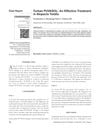Alopecia Areata: Chronic Inflammatory Skin Disorder
January 2015
in “
Springer eBooks
”

TLDR The document says a skin condition called alopecia areata causes hair loss and stress, and is treated with strong skin creams, injections, or other therapies, but treatment success varies.
In 2015, the document described alopecia areata as a chronic inflammatory skin disorder that affects 1-2% of the population and can cause significant psychological distress. The primary treatment mentioned was high-potency topical corticosteroids, with 0.05% clobetasol propionate for scalp alopecia areata. For persistent or corticosteroid-resistant cases, topical immunotherapy with agents like DCP or SADBE, and intralesional corticosteroids such as triamcinolone acetonide were recommended. Other treatments with limited evidence included topical dithranol, minoxidil, aroma oils, laser therapy, and systemic corticosteroids for severe cases. The document emphasized the importance of individualized treatment and supportive measures like counseling and patient support groups. It also noted that while over 60% of patients might see hair growth with intralesional corticosteroids, treatments like minoxidil, dithranol, aromatherapy, and laser therapy had varying levels of evidence, and systemic treatments and phototherapy with PUVA were not highly recommended due to side effects and uncertain efficacy. Guidelines from the British Association of Dermatologists were referenced, ranking the evidence level of various treatments.












